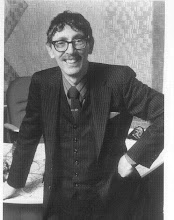Thursday, May 24, 2012
My Latest HuffPost Blog:New Trio of Hollywood Factoids!
A Trio of Intriguing Factoids From the Sci-Fi/Horror/Mystery Genre!
Posted: 05/22/2012 5:11 pm
Why was the ending of TV's The Quatermass Xperiment changed for the silver screen? What would be the ultimate destiny of The Incredible Shrinking Man?
Was screen credit denied to the stars of several cinematic and TV productions?
The fascinating answers to these questions are revealed herein!
-In the excellent 1955 British sci-fi flick, The Quatermass Xperiment (aka The Creeping Unknown), an alien bioform inhabiting space (technically a "xeroid") absorbs the bodies of two astronauts and infects a third, Victor Carroon (Richard Wordsworth), who crashes in London. Over time, as Carroon ingests various forms of life, such as several zoo animals, he grows into a huge amorphous creature. Ultimately, Dr. Bernard Quatermass (Brian Donlevy) zaps him with electricity via high-tension wires as the entity is entwined around a second-floor metal railing at Westminster Abbey and about to expand and multiply.
However, this was based on a 1953 six-part BBC series by Nigel Kneale in which Quatermass, at the end, rather than using force, reasoned with the three absorbed astronauts, convincing them to will the creature to die! Director Val Guest rewrote the ending for the film, feeling it needed to be more dramatic.
When Victor Carroon's wife (Margis Dean) and the man she hired to pose as an orderly to extricate him from the hospital, Christie (Harold Lang), are standing outside in the rain. you can see his hospital whites clearly getting drenched, but when he walks inside the hospital, he is totally dry!
Ruehl Fact: Donlevy essayed the role of Quatermass in the sequel, Quatermass 2 (aka The Enemy From Space) while Andrew Keir handled the role in the next entry, 1968's Quatermass and the Pit (aka Five Million Years To Earth), both first-rate performances. However, the final entry, 1980's Quatermass Conclusion (aka Quatermass) was a major disappointment, where John Mills, a fine actor, played Quatermass lamely without his previous dynamism, focusing mainly on locating his grandson.
-In a superbly inspirational ending by Richard Matheson, Grant Williams (as Scott Carey) in the title role of 1959's The Incredible Shrinking Man, after slaying what to him was a titanic spider, comes to accept the fact that he is continuing to shrink to infinitesimal proportions. He dramatically asserts, courtesy of writer Richard Matheson, "To God, there is no zero. I still exist!" However, at some point, sadly, he would diminish to less than the size of an oxygen atom and no longer be able to breathe and exist!
Ruehl Fact: William Schallert, who was the 1st doctor to diagnose Scott Carey's condition, appeared in numerous sci-fi and horror productions, such as an evil scientist in 1951's The Man From Planet X and as Commando Cody's assistant in the 1955 TV series, Commando Cody: Sky Marshal of the Universe.
-Uncredited roles: Vincent Price, reprising his role from 1940's The Invisible Man Returns, was heard (but, of course, not seen) as the "Invisible Man" in a rowboat with Abbott and Costello at the end of 1948's Abbott and Costello Meet Frankenstein.
Veteran stuntman Tom Steele played the title role in every chapter of the 1943 serial, The Masked Marvel, but did not receive any screen credit.
Kirk Alyn, who starred as Superman in the two 15-chapter serials, Superman (1948) and Atom Man vs. Superman (1950) was inexplicably not listed in the credits despite being seen flying at the beginning of each chapter before the credits.
The lead actor in 1959's British TV series, The Invisible Man, was never listed, perhaps because more than one actor essayed the role, the best-known being Tim Turner (11 episodes) and Johnny Scripps (9 episodes).
And, in the 1961 thriller TV episode, "Portrait Without A Face," John Newland, despite appearing in the crucial opening scene as a morally-bankrupt artist who is killed with an arrow and whose spirit dominates the ensuing story line, was not listed in the credits.
Ruehl Fact: John Newland's paranormal TV series, One Step Beyond (1959-61) was initially entitled Alcoa Presents to deceive network executives about the occult nature of the program which might have caused them to reject the series as too controversial
A Scene From "One Step Beyond":
A Tribute to the REAL Billy Wilder:
Follow Dr. Franklin Ruehl, Ph.D. on Twitter: www.twitter.com/
Subscribe to:
Post Comments (Atom)


No comments:
Post a Comment